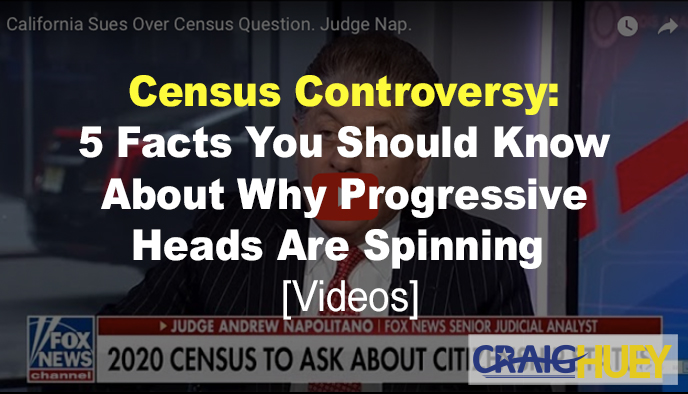The 2020 Census is coming … and the progressive left is going crazy…
Meanwhile the media is misrepresenting the truth…
They’re calling it unconstitutional … a “huge crisis for democracy”… and more.
Why?
Because President Trump wants to add a simple Yes/No citizenship question to the questionnaire.
The California State Attorney General says he is suing the Trump Administration over it … and New York’s Attorney General intends to organize a multi-state lawsuit.
To help you sort through all the emotional rhetoric about this issue, here are 5 facts about the U.S. Census and citizenship you should know:
- Those who are claiming the citizenship question is unconstitutional aren’t concerned about the Constitution … they’re concerned about losing power.
You see, progressives fear that if the census questionnaire asks, “Are you a U.S. citizen?” many illegal immigrants will be afraid to fill it out … fearing that it will lead to deportation…
If large numbers of illegals don’t complete the questionnaire, states with large populations of illegals will have their population underreported … and will end up losing seats in the House of Representatives – seats that would most likely be filled by Democrats.
Also, many of the federal block grants and other aid programs given to states are based on population … so if a state’s population is underreported, fewer federal dollars will be given to that state each year for the next 10 years.
- Article 1, Section 2 of the Constitution requires that a count of residents in each state take place every 10 years.
The purpose of the census is to apportion seats in the House of Representatives according to the population of each state.
- Based on the concept of “usual residence” – a principle established by the Census Act of 1790 – the Census Bureau counts:
- S. citizens
- Non-citizen legal residents
- Non-citizen long-term visitors
- Illegal immigrants
- The first census that included a specific question about citizenship was the 1820 census.
Since many of the founders of the Constitution were still alive in 1820 … they would have spoken out if adding a citizenship question was unconstitutional.
Between 1820 and 1950, nearly every decennial census questionnaire asked some form of a question about citizenship.
Between 1970 and 2000 both a short form and a long form census questionnaire was used…
The short form was sent to every household and did not include a citizenship question…
The long form was sent to only 1 out of 6 households and did include a citizenship question.
- The personal data supplied by individuals on census forms is sealed from public disclosure for 72 years after a census is taken.
Illegal immigrants do not need to fear they will be deported if they truthfully answer that they are not U.S. citizens.
- The only question on the census form that by law must be answered is how many residents there are in the home.
If a census respondent answers a question about citizenship … by law it must be answered truthfully…
But the Constitution also guarantees the right to remain silent … respondents can legally supply the number of residents only … and leave all other questions blank.
Watch Tucker Carlson tackle the citizenship question with 2 guests – one against asking about citizenship status … one in favor of it (about 10 ½ minutes). Click here to watch.
Also watch former New Jersey Superior Court Judge Andrew Napolitano explain the constitutional issues regarding the citizenship question on the census form (4 minutes):
https://www.youtube.com/watch?v=oHJ1y0Qf1rw
What do you think? Write me at [email protected]

